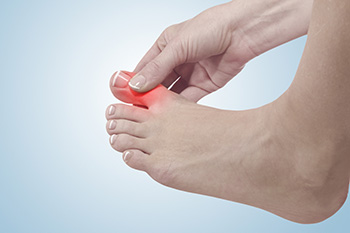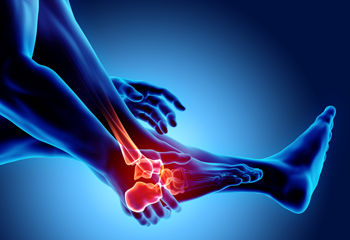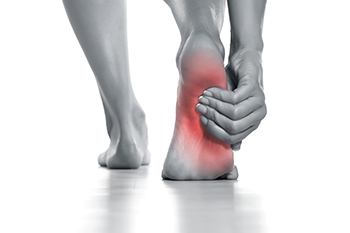
Sesamoiditis is the inflammation of the sesamoid bones, two small, pea-shaped bones located beneath the big toe joint. These bones play a key role in absorbing pressure, reducing friction, and helping the big toe move during activities like walking, running, or dancing. When they become inflamed, it can cause significant discomfort. This condition often affects those who put repetitive stress on the ball of their foot, such as dancers, runners, or athletes. It can also develop in individuals with high arches or frequent high heel wearers. The primary symptom is pain beneath the big toe, which typically intensifies with activity and eases with rest. To manage sesamoiditis, reducing pressure on the affected area is key. Wearing cushioned shoes or custom orthotics can help alleviate pain, while rest and anti-inflammatory medication can provide pain relief. If pain persists or worsens, seeking professional care is an important step. A podiatrist can offer an accurate diagnosis and tailored treatment plan. If you have this painful condition, it is suggested that you schedule an appointment to see a podiatrist for relief and treatment solutions.
Sesamoiditis is an unpleasant foot condition characterized by pain in the balls of the feet. If you think you’re struggling with sesamoiditis, contact Dr. Anna Petrov of Family Foot & Ankle Care. Our doctor will treat your condition thoroughly and effectively.
Sesamoiditis
Sesamoiditis is a condition of the foot that affects the ball of the foot. It is more common in younger people than it is in older people. It can also occur with people who have begun a new exercise program, since their bodies are adjusting to the new physical regimen. Pain may also be caused by the inflammation of tendons surrounding the bones. It is important to seek treatment in its early stages because if you ignore the pain, this condition can lead to more serious problems such as severe irritation and bone fractures.
Causes of Sesamoiditis
- Sudden increase in activity
- Increase in physically strenuous movement without a proper warm up or build up
- Foot structure: those who have smaller, bonier feet or those with a high arch may be more susceptible
Treatment for sesamoiditis is non-invasive and simple. Doctors may recommend a strict rest period where the patient forgoes most physical activity. This will help give the patient time to heal their feet through limited activity. For serious cases, it is best to speak with your doctor to determine a treatment option that will help your specific needs.
If you have any questions please feel free to contact one of our offices located in Wheeling and Chicago, IL . We offer the newest diagnostic and treatment technologies for all your foot and ankle needs.

Rheumatoid arthritis that affects the ankles can result in persistent pain, swelling, and joint stiffness that interferes with daily movement. Rheumatoid arthritis causes inflammation in the synovium, a membrane that lines the ankle joints, which leads to excess fluid buildup and joint instability. As the arthritis advances, people may experience difficulty walking, numbness from nerve compression, and visible changes in ankle structure. A podiatrist can assess the severity of joint damage to determine a treatment approach. In many cases, steroid injections may be recommended to relieve inflammation. Also, bracing can help stabilize the ankle and reduce pressure on the affected joints. If symptoms continue despite conservative measures, surgery may be necessary. Ankle fusion, known as arthrodesis, involves joining the bones of the ankle to reduce pain caused by joint movement. For more advanced joint deterioration, a podiatrist may recommend total ankle replacement to restore function. If you have ankle pain that may be caused by rheumatoid arthritis, it is suggested that you schedule an appointment with a podiatrist for an exam and appropriate treatment options.
Ankle pain can have many different causes and the pain may potentially be serious. If you have ankle pain, consult with Dr. Anna Petrov from Family Foot & Ankle Care. Our doctor will assess your condition and provide you with quality foot and ankle treatment.
Ankle pain is any condition that causes pain in the ankle. Due to the fact that the ankle consists of tendons, muscles, bones, and ligaments, ankle pain can come from a number of different conditions.
Causes
The most common causes of ankle pain include:
- Types of arthritis (rheumatoid, osteoarthritis, and gout)
- Ankle sprains
- Broken ankles
- Achilles tendinitis
- Achilles tendon rupture
- Stress fractures
- Tarsal tunnel syndrome
- Plantar fasciitis
Symptoms
Symptoms of ankle injury vary based upon the condition. Pain may include general pain and discomfort, swelling, aching, redness, bruising, burning or stabbing sensations, and/or loss of sensation.
Diagnosis
Due to the wide variety of potential causes of ankle pain, podiatrists will utilize a number of different methods to properly diagnose ankle pain. This can include asking for personal and family medical histories and of any recent injuries. Further diagnosis may include sensation tests, a physical examination, and potentially x-rays or other imaging tests.
Treatment
Just as the range of causes varies widely, so do treatments. Some more common treatments are rest, ice packs, keeping pressure off the foot, orthotics and braces, medication for inflammation and pain, and surgery.
If you have any questions, please feel free to contact one of our offices located in Wheeling and Chicago, IL . We offer the newest diagnostic and treatment technologies for all your foot care needs.

Foot arch pain is often linked to problems with the abductor hallucis muscle, which supports the arch and controls movement of the big toe. This muscle can become strained due to overuse, especially in people with flat feet or those who spend long hours standing or walking. Poor footwear that lacks arch support can increase the risk of arch pain. Symptoms may include tenderness along the inside of the foot, swelling, or a tight feeling when pressing on the muscle. A podiatrist can diagnose the source of the foot arch pain by examining your foot’s structure, testing its range of motion, and using imaging, if needed, to rule out other injuries. Medical treatment options include prescription orthotics to support the arch and reduce strain. In more severe cases, surgery might be necessary if nerve compression or lasting damage is found. If you have pain in the arch of your foot, it is suggested that you schedule an appointment with a podiatrist for a diagnosis and appropriate treatment.
Foot Pain
Foot pain can be extremely painful and debilitating. If you have a foot pain, consult with Dr. Anna Petrov from Family Foot & Ankle Care. Our doctor will assess your condition and provide you with quality foot and ankle treatment.
Causes
Foot pain is a very broad condition that could be caused by one or more ailments. The most common include:
- Bunions
- Hammertoes
- Plantar Fasciitis
- Bone Spurs
- Corns
- Tarsal Tunnel Syndrome
- Ingrown Toenails
- Arthritis (such as Gout, Rheumatoid, and Osteoarthritis)
- Flat Feet
- Injury (from stress fractures, broken toe, foot, ankle, Achilles tendon ruptures, and sprains)
- And more
Diagnosis
To figure out the cause of foot pain, podiatrists utilize several different methods. This can range from simple visual inspections and sensation tests to X-rays and MRI scans. Prior medical history, family medical history, and any recent physical traumatic events will all be taken into consideration for a proper diagnosis.
Treatment
Treatment depends upon the cause of the foot pain. Whether it is resting, staying off the foot, or having surgery; podiatrists have a number of treatment options available for foot pain.
If you have any questions, please feel free to contact one of our offices located in Wheeling and Chicago, IL . We offer the newest diagnostic and treatment technologies for all your foot care needs.








